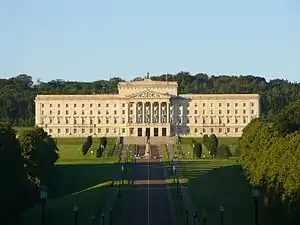Member of the Legislative Assembly (Northern Ireland)
Members of the Legislative Assembly (MLAs; Irish: Comhaltaí den Tionól Reachtach; Ulster-Scots: Laa-Makkan Forgaitherars) are representatives elected by the voters to the Northern Ireland Assembly.

 |
|---|
| This article is part of a series on the politics and government of Northern Ireland |
About
The Northern Ireland Assembly has 90 elected members - five from each of 18 constituencies, the boundaries of which are the same as those used for electing members of the UK Parliament. Its role is primarily to scrutinise and make decisions on the issues dealt with by Government Departments and to consider and make legislation.[1]
Responsibilities
MLAs are responsible for the Northern Ireland Assembly.
Salary
The basic salary for an MLA is £49,500 while the Speaker, ministers and committee chairs receive an additional 'Office Holders Salary' on top of their basic salary.[2]
History
Previous similar legislators
From 22 June 1921 until 30 March 1972 MPs of the House of Commons of Northern Ireland and Senators of the Senate of Northern Ireland in the Parliament of Northern Ireland legislated for Northern Ireland like MLAs do today.
Northern Ireland Assembly legislators
Following a referendum on the Belfast Agreement on 23 May 1998 and the granting of Royal Assent to the Northern Ireland Act 1998 on 19 November 1998; a Northern Ireland Assembly and Northern Ireland Executive were established by the Labour government of Prime Minister Tony Blair. The process was known as devolution and was set up to give Northern Ireland devolved legislative powers. MLAs are responsible for the Northern Ireland Assembly.
Northern Ireland Assembly 2017
The Assembly Members (Reduction of Numbers) Act (Northern Ireland) 2016 will mean that the number of MLAs will be reduced from 108 to 90.
Members of the Legislative Assembly
- Members of the Northern Ireland Assembly elected in 2017
- Members of the Northern Ireland Assembly elected in 2016
- Members of the Northern Ireland Assembly elected in 2011
- Members of the Northern Ireland Assembly elected in 2007
- Members of the Northern Ireland Assembly elected in 2003
- Members of the Northern Ireland Assembly elected in 1998
- Members of the Northern Ireland Assembly elected in 1982
- Members of the Northern Ireland Assembly elected in 1973
See also
References
- http://www.niassembly.gov.uk/io/summary/new_summary.htm#2 Archived 19 April 2008 at the Wayback Machine
- "Members' Salaries 2013-2014". niassembly.gov.uk.

